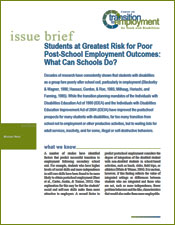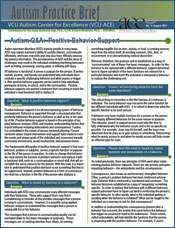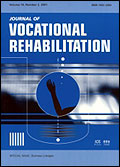Information, resources and research about work and disability issues
VCU Autism Center for Excellence
Webcast
|
In this presentation, Sam and his mom, Bradford, will share Sam's journey and some of the tools used to facilitate the path to an "extra" ordinary life for him. This presentation will discuss how these principals were used throughout his entire lifetime and are still utilized now as he is preparing for the transition to adulthood. Register for this webcast or Register for the Series. Group rates available. Cost: $50. * Note: This training is free to Virginia participants. VCU-ACE is funded by the VA DOE (Grant # 881-61172-H027A100107). For additional information, contact autismcenter@vcu.edu or (855) 711-6987. |
The Center on Transition to Employment for Youth with Disabilities Issue Brief
 Students at Greatest Risk for Poor Post-School Employment Outcomes: What Can Schools Do?
Students at Greatest Risk for Poor Post-School Employment Outcomes: What Can Schools Do?
Decades of research have consistently shown that students with disabilities as a group fare poorly after school exit, particularly in employment. While the transition planning mandates of the Individuals with Disabilities Education Act of 1990 (IDEA) and the Individuals with Disabilities Education Improvement Act of 2004 (IDEIA) have improved the postschool prospects for many students with disabilities, far too many transition from school not to employment or other productive activities, but to waiting lists for adult services, inactivity, and for some, illegal or self-destructive behaviors. What We Know (PDF & Text Available)
The Center for Transition to Employment is a Disability Rehabilitation Research Project sponsored by The National Institute on Disability and Rehabilitation Research, U.S. Department of Education. The Center is operated by TransCen, Inc. in partnership with Virginia Commonwealth University.
Upcoming Events
KTER Center - Workshop for NIDRR and RSA Grantees - Barriers and Supports for Research Use, April 28, 2012 - Find out more information about the workshop and its presenters
APSE 2012 National Conference - June 27-29, Pre-Conference Day - June 26, Crystal Gateway Marriott, Arlington, VA - More Information & Online Registration
April Online Course - There's still time to register!
Supported Employment for Individuals with Traumatic Brain Injury Apr 23 - May 21, 2012
Early demonstration projects back in the late 1980's and 90's paved the way for using a supported employment approach for someone who has sustained traumatic brain injury (TBI). Although the principles and values associated with the individual approach to supported employment remain consistent, there are some different considerations an employment specialist should take into account when serving a person with a TBI. This course will offer participants an overview of TBI and the supported employment literature suggestions on specific strategies to use to get to know the job seeker, look at possible workplace supports with an emphasis on compensatory memory strategies and some insight into ways to provide pro-active job retention services. Cost: $125. Find out more & Register
VCU-ACE Q&A Factsheet
 Autism Q&A: Positive Behavior Support
Autism Q&A: Positive Behavior Support
Autism spectrum disorders (ASD) impacts people in many ways.
ASD may impact a person's ability to socially interact, communicate
effectively, and learn new skills and may also have difficulty processing
sensory information. The pervasiveness of ASD and the array of challenges may result in the individual exhibiting interfering behaviors such as hitting, screaming, running away or inflicting self-injury. All behavior is functional; it serves a purpose for the person. If professionals, parents, and friends can understand why individuals demonstrate
a specific challenging behavior and what causes or trigger
it, then positive behavior supports can be used to help individuals
participate at home, in school, and in the communities. Positive
behavior supports can prevent a behavior from occurring or teach the
individual a new functional skill to replace it.
VCU-ACE is funded by the VA DOE (Grant # 881-61172-H027A100107). For additional information, contact autismcenter@vcu.edu or (855) 711-6987.
JVR Article
 Work Incentives Planning and Assistance Program: Current program results document the program's ability to improve employment outcomes, reduce dependence on benefits,and generate cost savings for SSA by John Kregel
Work Incentives Planning and Assistance Program: Current program results document the program's ability to improve employment outcomes, reduce dependence on benefits,and generate cost savings for SSA by John Kregel
In recent years the demand for Social Security benefits have increased while its resources stay the same. Persons who are disabled are among the more impacted Social Security beneficiaries. There are effective state and federally basedWork Incentive Programs that can alleviate this burden and better assist disabled persons. Several studies examining Work Incentive programs are reviewed and recommendations based on their findings are given. This testimony was delivered to the United States House of Representatives, Ways and Means Committee, Subcommittees on Social Security and Human Resources.
*Join APSE to receive free online access to JVR
 Worksupport.com
Worksupport.com
